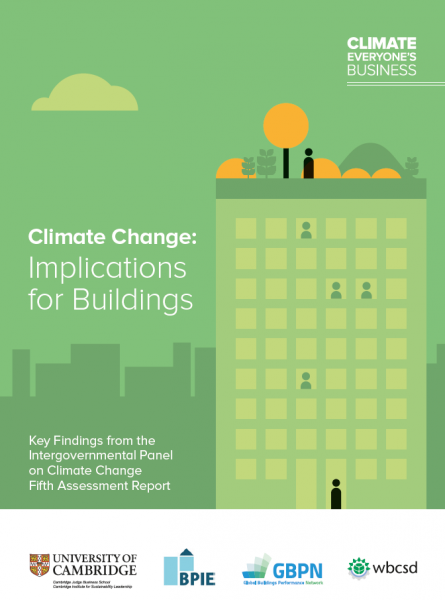Climate Change: Implications for Buildings. Key findings from the IPCC

Highly renowned organisations teamed-up to provide businesses and policy makers around the world with a short summary of the Intergovernmental Panel on Climate Change‘s Fifth Assessment report (AR5), focusing on buildings. This is now corroborated that the world’s buildings account for a large share of the global final energy use and greenhouse gas (GHG) emissions.
This overview of the key findings stresses the major role of buildings to effectively addressing climate change, and shows that stronger building codes have a real impact.
There is major potential for energy savings of up to 50–90% in existing and new buildings.
Exploiting this potential more widely requires sustained policies and actionsthat address all aspects of the design, construction, and operation of buildings and their equipment, as well as changing user behaviours and attitudes. For developed countries, scenarios indicate that lifestyle and behavioural changes could reduce energy demand by up to 20% in the short term and by up to 50% of present levels by 2050.
Building codes and appliance standards have proven to be among the most environmentally and cost-effective instruments to reduce emissions. If these codes are largely reinforced and extended to more building and appliance types, resilience will be strengthened and carbon emissions could decrease..
This Buildings summary is one of a series of thirteen, based upon The Fifth Assessment Report (AR5) of the Intergovernmental Panel on Climate Change (IPCC). AR5 represents the most comprehensive overview of climate science to date and is the fact base that will be used by governments and businesses to formulate climate policy in the coming years.
The following partners have teamed-up to extract AR5 content into concise, clear, relevant findings:
- Buildings Performance Institute Europe (BPIE),
- Global Buildings Performance Network (GBPN),
- World Business Council for Sustainable Development (WBCSD),
- University of Cambridge Institute for Sustainability Leadership (CISL),
- Cambridge Judge Business School (CJBS)
- European Climate Foundation (ECF)
To download the other reports (agriculture, defence, cities...)
Tweet about this report using the hashtag #AR5Buildings, @BPIE_eu



